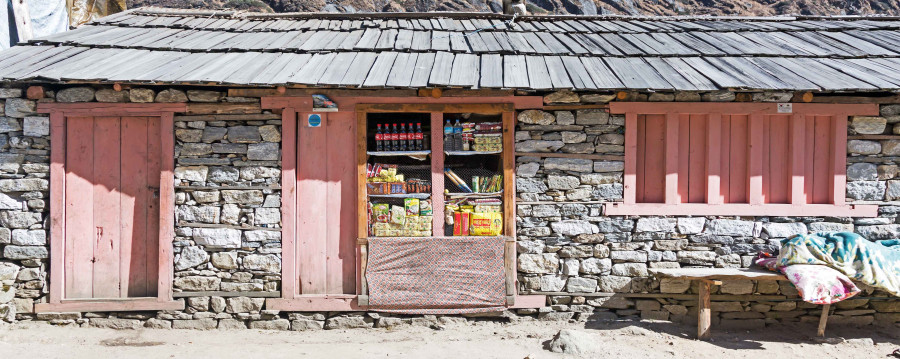Money
Recovery in sales of fast-moving consumer goods slow
Demand is still down in rural areas despite a surge in orders from e-commerce platforms in urban centres, firms say.
Krishana Prasain
Overall demand for fast-moving consumer goods is still down due to slow rural sales despite a surge in orders from e-commerce platforms in urban areas, firms said.
Market demand is yet to reach pre-lockdown levels even though six months have passed since the end of the lockdown, and the government has allowed businesses to operate freely, they said.
A follow-up survey conducted by Nepal Rastra Bank from October 29 to December 9 showed that 54 percent of the factories and companies had started full-fledged production or operation since the stay-home order was withdrawn.
Employment in these companies has recovered to 87.51 percent of pre-lockdown levels.
According to Tikendra Kumar Shiwakoti, country sales manager of Asian Biscuit and Confectionery, there was negative growth in overall food production like biscuit, noodle, confectionery and beverage in the first half of the fiscal year compared to the same period of the previous year. “Overall, sales have declined by 25 percent,” he said.
Normally, demand for fast-moving consumer goods swells following the harvest season of key crops in rural areas, but industry insiders say sales have not picked up in rural markets.
Anjan Shrestha, executive director of the Laxmi Group, manufacturer of confectionery and dairy products under Sujal Foods, said that consumption patterns were impacted by the pandemic with consumers focusing on buying essentials.
With the situation gradually improving, demand will likely bounce back by the end of this fiscal year, said Shrestha who is also vice-president (commodity) of the Federation of Nepalese Chambers of Commerce and Industry.
“Factories were operating at 30-40 percent of capacity, and this figure has now gone up to 60-70 percent,” he said. “Food consumption has declined as people were making less money, resulting in slowed demand in the market.”
With educational institutions closed and many people working from home, demand for packaged foods has dropped, Shiwakoti added. The purchasing power has also gone down, and people have been forced to cut extra expenses, he said.
Asian Biscuit and Confectionery, maker of Goodlife biscuit, 2pm noodles and Rum Pum, Imli Bomb and Chocho Luv brands of confectionery, observed a rise in demand in regions near the Indian border as people were prevented from border hopping to do their shopping during the lockdown.
“When the border was closed, people had to consume domestic products; but Nepali fast-moving consumer goods have always faced stiff competition from Indian products. The raw material supply chain has been impacted internationally, and prices have risen with a spike in global demand, pushing up the price of finished goods," said Shiwakoti.
“As there is no authentic data regarding prices with private organisations or the government, it is difficult to say by how much prices have increased,” Shrestha added.
Manufacturers say the cost of production has increased as raw material prices, transportation charges and factory expenses have swelled due to the pandemic. “We have not increased the prices of our products, but it has become a challenge to operate with the high cost of production. It will be difficult to remain in business without increasing prices in the coming days,” Shiwakoti said.
“A decade ago, you could buy three packets of Preeti noodles for Rs20, now a single packet costs the same amount. The price of noodles has risen, but biscuit prices have not increased in the same ratio as consumers still prefer imported biscuits compared to domestic brands," Shiwakoti said.
Most factories are running at half of capacity due to the slow sales, he said.
In a bid to diversify its product line, Asian Biscuit and Confectionery launched 2pm Ramen which is selling quite well, Shiwakoti said. Product diversification can be an opportunity to gain market demand in the current situation.
Noodles sell well in the domestic market even when sales of biscuits, confectionery items and beverages slow down. Consumption of dairy products has decreased.
"People are still avoiding going on long tours, and hotels and restaurants are having a hard time with tourism still immobile. These reasons have hit the consumption of fast-moving consumer goods," he added.
Nepal's largest fast-moving consumer goods company, Unilever Nepal, posted a 66.64 percent drop in net profit in the fourth quarter or fiscal 2019-20. The company said its net profit decreased from Rs1.06 billion to Rs355.3 million due to the lockdown enforced by the government.
According to the Trade and Export Promotion Centre, exports of noodles soared by 63 percent in the first six months of the current fiscal year. Nepal shipped noodles worth Rs954 million in the first half. Traders said that exports increased because all stocked goods during the lockdown were delivered.
Nepal's imports of sweet biscuits swelled to Rs984 million in the first six months from Rs712 million in the same period in the last fiscal year.
Chewing gum imports were valued at Rs329 million compared to Rs269 million previously.
The country imported Kurkure, Kurmure, Lays and Cheese balls worth Rs358 million in the first six months of the current fiscal year, up from Rs355 million previously.
During the same six-month period, chocolate imports totalled Rs769 million compared to Rs929 million previously.
Nepal imported non-alcoholic soft drinks worth Rs1.47 billion in the first six months of the current fiscal year, down from Rs1.72 billion during the same period in the last fiscal year.




 9.7°C Kathmandu
9.7°C Kathmandu















